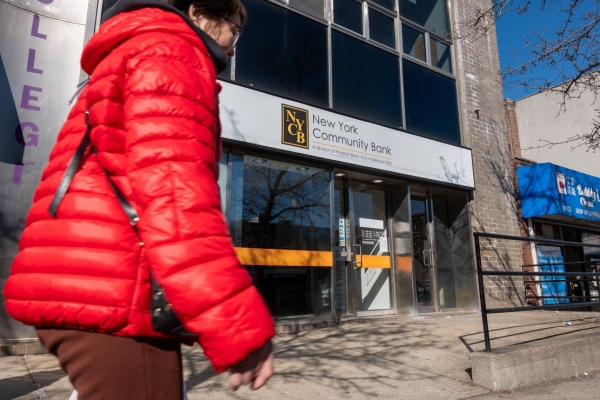Remote work can be amazing for employees. Less time in stuffy offices and commuting on crowded highways means more time and energy for everything else in life.
But remote work is not so great for landlords — or their lenders.
Once-bustling office buildings are empty. Inevitably, some landlords will go bust. And banks that lent to developers will get burned.
None of this is breaking news.
The writing has been on the wall in the $20 trillion commercial real estate market for years — ever since Zoom calls and working in sweatpants became a way of life for many during the Covid-19 pandemic.
And yet Wall Street is suddenly freaking out about bad real estate loans and empty office buildings.
One regional lender — New York Community Bancorp — has seen its stock price implode and its credit rating slashed to junk in part because of its exposure to bad office loans. Japan’s Aozora Bank startled investors by blaming bad loans linked to US offices for a projected loss. And a German lender set aside a mountain of money to brace for the “greatest real estate crisis since the financial crisis.”
‘Perfect storm’
All of this is bringing back bad memories of early 2023 when a pair of major US banks suddenly imploded and officials in Washington scrambled to put out the fire.
Except now, the fear is empty office buildings, not the depressed value of bonds banks are sitting on.
The slow-motion train wreck nature of this period of stress (“Don’t call it a crisis,” they’re inevitably saying right now in the halls of Washington) makes some sense.
After all, leases are typically signed for multiple years. It’s only when a five-year lease expires that the office which has been nearly vacant since 2020 becomes a problem.
Even if a tenant stays, the bank, tech or media company will likely need less space. Instead of four floors, maybe it’s two now. Or one. And surely they won’t pay pre-Covid rates for this office space. Not when there’s so much supply on the market.
“As leases turn over and occupancy needs change, you can get a perfect storm of events,” said Ed Mills, Washington policy analyst at Raymond James.
High rates add to the problems
Not only are office leases expiring, but loans are coming due.
Developers are having trouble refinancing their loans because the value of the office buildings has plunged as vacancy rates spike. Their pre-Covid gameplan to charge top-dollar for office space has been ruined by remote work.
And then the icing on the cake: It’s no longer dirt cheap to borrow.
The days of near-zero interest rates vanished as soon as “transitory” became a bad word among central bankers. To fight persistent inflation, the Federal Reserve spiked interest rates at a pace that would make legendary Fed chief Paul Volcker proud.
Inflation seems to be under control today, but rates are still very high. That’s a major problem for an industry like real estate known for piling on debt.
Now, developers must refinance their debt, except at higher rates and at lower valuations.
Some landlords will default — leaving the banks holding the bag.
Bracing for bad loans
Of course, banks and their regulators have learned a lot of lessons from last year’s banking crisis.
Regulators are not being shy about forcing banks to stock up on capital to cushion the blow from loan losses — instead of paying out dividends.
For instance, New York Community Bancorp shocked investors last week by slashing its dividend and setting aside $552 million in loan losses during the fourth quarter. That’s nearly 10 times the amount it set aside in the third quarter.

A New York Community Bank stands in Brooklyn on February 08, 2024 in New York City.
Spencer Platt/Getty Images
The Long Island-based lender revealed a surprise loss of $252 million — a sharp reversal from its profit of nearly $200 million the year before. New York Community Bancorp blamed the “deterioration” of office properties in its portfolio as well as trouble in its residential loans.
“We’re laser-focused on reducing our CRE [commercial real estate] concentration as quickly as we can,” Alessandro DiNello, NYCB’s newly installed executive chairman, promised investors earlier this week.
NYCB insists its deposits are stable and it has the liquidity to ride out the storm.
Powell: This stress could last ‘years’
Yet even Treasury Secretary Janet Yellen conceded earlier this week that some banks may be “quite stressed” by the real estate issues.
Federal Reserve Chair Jerome Powell told “60 Minutes” in an interview that the real estate problem is “sizable” and could last “for years.”
However, Powell stressed “it doesn’t appear to have the makings of the kind of crisis – things that we’ve seen sometimes in the past, for example, with the global financial crisis.”
Mills, the Raymond James analyst, said regulators are “walking a fine line” in their public comments.
“They need to make sure they don’t create panic – but they also don’t want to own potential failures,” he said.
Mark Zandi: Some banks will fail
Still, Mark Zandi, chief economist at Moody’s Analytics, told CNN some banks will fail because of the commercial real estate stress.
“I would be shocked if there weren’t some that failed,” Zandi said.
Importantly, Zandi said these bank failures will be limited to smaller lenders — the ones sitting on suddenly shaky office loans.
Thankfully, the megabanks — the ones at the heart of the 2008 financial meltdown — have little direct exposure.
“I wouldn’t characterize this as a crisis,” said Zandi. “At least not yet.”
Banks are trying to avoid an imminent crisis by working with distressed landlords.
A more aggressive approach would backfire, forcing property owners to dump properties in fire sales — causing all valuations to go down.
“They’re buying time,” Zandi said. “They don’t want to shove anyone into default and force distressed sales. You could get into a doom loop.”

